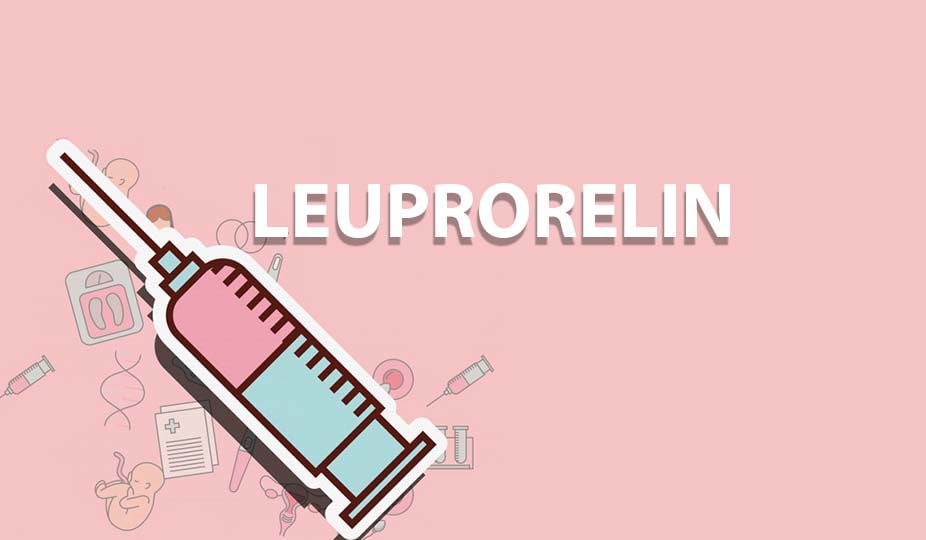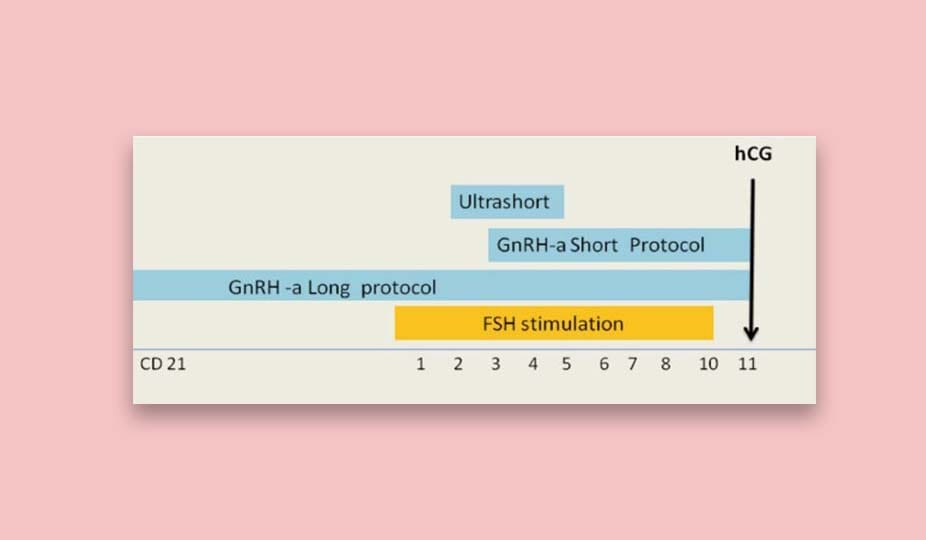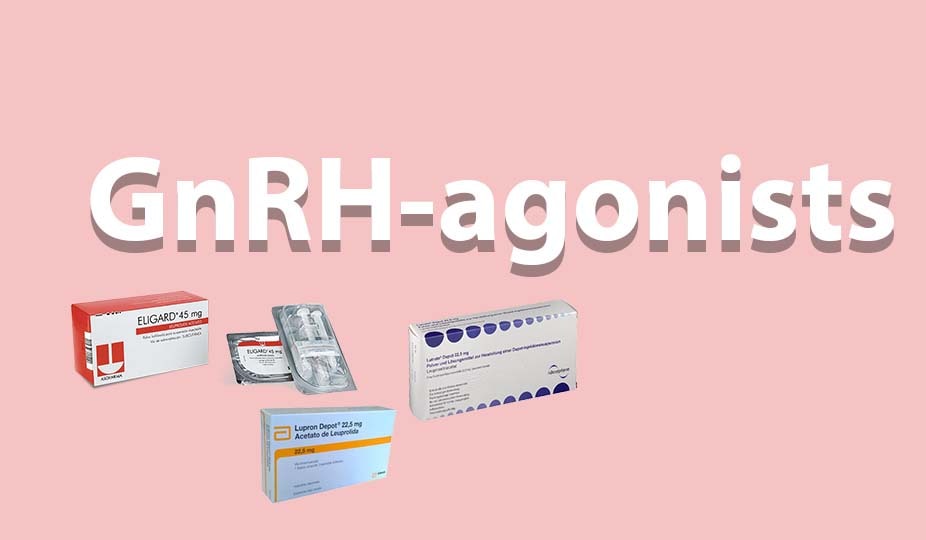Leuprorelin and IVF – Medical Form, Injection Guide, Side Effects
Leuprorelin is one of the most widely used IVF drugs. It is an agonist (analog) of gonadotropin-releasing hormone (GnRH) that inhibits the estrogen and other sex hormones production during the IVF programs. In layman’s terms, it helps to take control of ovulation and oocyte production. In this article, we will explain how exactly leuprorelin IVF treatment works, show you the right injection way, and share the possible side effects it can have.

What Is Leuprorelin – Medical Form
Leuprorelin goes granulate for the preparation of a suspension in ampoules of 0.00375 g and 0.0075 g. Before using, you should complete it with a solvent.
Farm Action
Leuprorelin is a synthetic analog of gonadotropin-releasing hormone (GnRH).
At the beginning of the use, the secretion of gonadotropic pituitary hormones (pituitary hormones that stimulate the activity of the gonads) increases. With the systematic use of the drug, receptors desensitize. It means that the cells weaker respond to gonadotropin-releasing hormone. Consequently, the secretion of gonadotropins and sex hormones decreases.
This effect is reversible. It means that after the cessation of drug use, the physiological secretion of hormones restores.
Intramuscular injection of a leuprorelin suspension leads to the formation of an intramuscular drug depot. It allows you to maintain a sufficient concentration of the drug for a month in case of prolonged fertility treatment, or gradually increase its level within an IVF protocol.
How IVF Protocols with Leuprorelin Work

For each patient, doctors use an individual IVF treatment, a protocol. Depending on age, chronic diseases, causes of infertility, allergic reactions, etc. the reproductologist decides which protocol is right. Each protocol applies partial or complete suppression of follicle-stimulating and luteinizing hormones (LH). Doctors monitor the process of ovarian stimulation using ultrasound to adjust the dosage of the drug on time or replace it if necessary. Usually, every day the endometrium should increase by 1 mm, and follicles by 2 mm.
There are three main types of IVF protocols with the use of Leuprorelin, short, long, and super long. The main idea of using this drug is to prevent natural ovulation and give the body much time to build eggs.
Short IVF Protocol
With a short protocol, the patient doesn`t need blocking. The stimulation of ovulation starts on the 2-3rd day of the menstrual cycle. The patient takes gonadotropin medications for 10-14 days. Doses of drugs are selected individually. As soon as the follicles mature, doctors use chorionic gonadotropin (hCG) or a gonadotropin-releasing hormone agonist (GnRH). 36-46 hours later, they make the oocyte retrieval via puncture. Puncture in a short protocol is carried out on the 12-15th day of the menstrual cycle.
Long Protocol with Leuprorelin
The doctors use long IVF protocol if a woman has endometriosis, ovarian cysts, benign neoplasms, or the eggs from the short protocol are of poor quality. The process begins with the blockade of LH and GnRH. In the second (luteal) phase of the menstrual cycle. I.e., on the 20-21st day, doctors prescribe you gonadotropin hormone agonists, such as leuprorelin. These drugs suppress the production of hormones in the ovaries. On days 2-4 of the next cycle, ovulation stimulation begins. Follicles mature for 10-14 days, and, when they reach an appropriate size, doctors make an ovulation trigger, 36 hours before follicle puncture. Usually, this occurs on day 12-15 of the cycle. That is, the retrieval should approximately coincide with your natural ovulation.
Super-long Protocol
The super-long protocol lasts up to six months. It is for women with endometriosis and fibroids. All this time, the ovaries are suppressed by the LH blockade. When the size of the cysts or fibroids decreases, ovarian stimulation begins. It lasts about 10 days.
Medical Uses of Leuprorelin
Leuprorelin is widely used to treat endometriosis. Endometriosis is the appearance of tissue sites similar in structure to the inner lining of the uterus and undergoing cyclic changes according to the menstrual cycle. Medications with leuprorelin can reduce abdominal pain and other endometriosis symptoms.
Moreover, the medication helps to reduce pain and lead to the regression of intrauterine pathological changes.
Leuprorelin IVF implies the use of GnRH drugs within the short, long, and super-long protocol.
Additionally, in men, it is used to treat prostate cancer as an alternative to surgical removal of the testicles when the use of estrogens, female sex hormones, are unacceptable for the treatment of a particular patient.
Leuprorelin IVF Dosage
The dose of the drug is set individually in each case. You should strictly follow the doctor’s prescription. During the IVF cycle, the dosage can be regulated based on the ultrasound.
For long IVF protocol, you can make intramuscular injections at home or go to the clinic. Most often, patients make the injection aside the belly button or in the leg. You can check this video to see how to make multi-dose IVF injections at home.
*If menstrual function persists during treatment with the drug, it is necessary to notify the attending physician.
*In the case of pregnancy, you should immediately discontinue the medication.
*Never inject the areas that are bruised, red or hard.
Leuprorelin Injection Side Effects
When injecting leuprorelin, symptoms characteristic of patients with decreased estrogen secretion may be observed. After completion of treatment, the level of estrogen gradually reaches typical values.
Within a usual IVF program (long protocol), the patients take leuprorelin during 12-14 weeks. Therefore, the side effects are temporary and quickly disappear at the end of the course. However, in the case of endometriosis treatment, which takes up to 6 months, there are several possible prolonged symptoms.
Induced hypoestrogenic status (a decrease in the level of estrogen in the body under the influence of the drug) leads to bone thinning during the treatment. Other side effects patients might have are as follows:
- Libido decreasing;
- Headaches;
- Dizziness;
- Mood changes, depression;
- Bloating and weight gain;
- Vomiting and nausea;
With a 6-month course of treatment, the symptoms go away. In case of severe symptoms, the doctor may additionally prescribe you progestin.
Contraindications of Leuprorelin IVF
- Hypersensitivity to gonadotropin-releasing hormone and its analogs;
- uterine bleeding of undiagnosed genesis (unknown cause);
- pregnancy;
- breastfeeding.
Smoking and regular alcohol consumption increase the risk of osteoporosis (malnutrition of bone tissue, accompanied by an increase in its fragility).
Medical Brand Names

Here is the list of medications containing leuprorelin:
- Eligard;
- Eliprogel;
- Enantone;
- Ginecrin;
- Lupron;
- Lutrate;
- Politrate;
- Procren.
The medication should be stored open no more than 29 days in a dark, cold place.
Leuprorelin IVF – Final Words
The most important thing when you start fertility treatment is to follow the doctor’s recommendations strictly. If you have not yet chosen an expert clinic or an egg donor, use our free database or consult Sunshine IVF experts for free, We are always here to give you a hand and help to complete your family!
